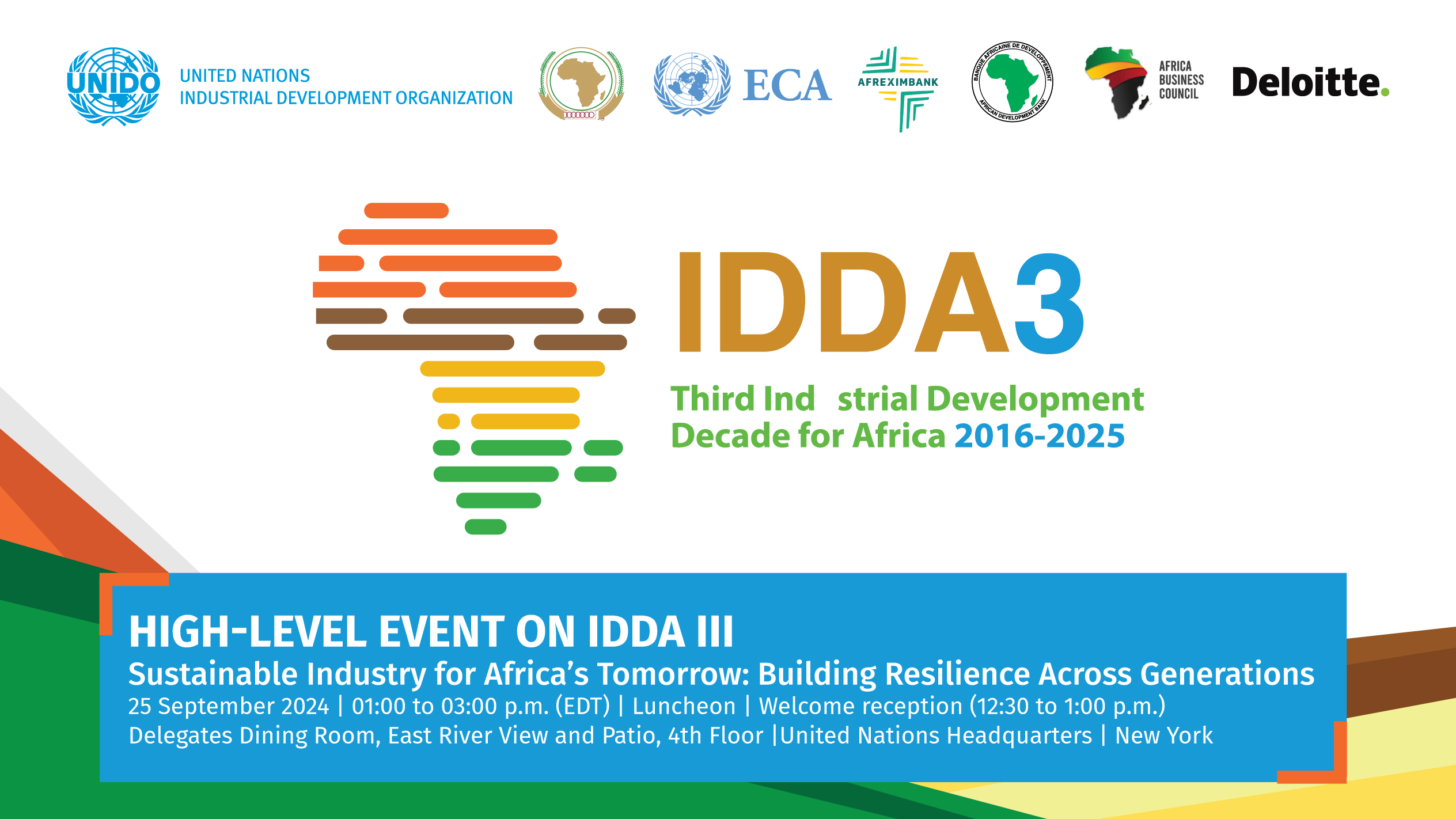25 Sep 2024, 13:00
25 Sep 2024, 15:00
Delegates Dining Room, East River View and Patio, UN HQ, New York
UNIDO, AUC, UNECA, in partnership with the African Development Bank, African Export-Import Bank, African Business Council, and Deloitte

Background:
In July 2016, the UN General Assembly adopted resolution A/RES/70/293, declaring 2016-2025 as the Third Industrial Development Decade for Africa (IDDA III). IDDA III aims to drive Africa’s industrial growth in alignment with global frameworks like the UN SDGs, the AU’s Agenda 2063, and various international cooperation platforms.
Seventh High-Level Event on IDDA III:
This year's event is especially significant as the seventh and final high-level gathering under IDDA III. As the decade concludes in July 2025, an independent evaluation will provide crucial insights for planning its successor. This event offers a vital opportunity to assess progress, celebrate achievements, address challenges, and collaboratively plan the path forward in light of current trends.
The event is jointly organized by AUC, UNECA and UNIDO, in partnership with the African Development Bank, African Export-Import Bank, African Business Council, and Deloitte.
The high-level event on IDDA III takes place following the UN Summit of the Future and will have heightened relevance, urging stakeholders to explore strategies and present concrete solutions to implement the Pact for the Future in Africa, and transform the continent’s industrial landscape into a model of sustainability and resilience.
Theme
The theme “Sustainable Industry for Africa’s Tomorrow: Building Resilience Across Generations” reflects the critical need for sustainable industrial development that not only addresses current challenges but also fortifies the continent against future uncertainties. It also underscores the necessity of Africa's industrial development being economically viable, environmentally sustainable, and socially inclusive.
Sustainable industrial development is crucial for Africa, not only to ensure sustained industrial gains but also to support intergenerational resilience, which requires innovative industries capable of withstanding economic, environmental, and social shocks.
The following sub-themes will further guide the discussions: economic diversification and industrialization; innovation, technology and digitalization; investment and financing; policy and governance; capacity building and education; and green industrialization.
Objectives
As IDDA III nears its final year, this event is essential for reflecting on Africa’s decade-long industrialization efforts, focusing on building resilient and sustainable systems for future generations. It will explore strategies for accelerating Africa’s structural transformation through industrialization and economic diversification, advancing both the SDGs and the African Union's Agenda 2063.
Following the adoption of the Pact for the Future, the event provides a unique opportunity to discuss concrete steps for fulfilling its commitments and implementing multilateral solutions for inclusive growth and sustainable development in Africa.
Expected Outcomes
- A joint communiqué on “Sustainable Industry for Africa’s Tomorrow: Building Resilience Across Generations.”
- Identification of key actions to implement the Pact for the Future in Africa, supporting sustainable industrial development across areas like poverty eradication, hunger, digital technologies, and trade facilitation.
- Renewed partnerships among governments, the private sector, and international organizations to support sustainable industrial growth.
- Launch of initiatives to scale up technical cooperation, promote investments, and introduce innovative financing for sustainable industries.
Luncheon and Reception:
This high-level event will feature a luncheon, preceded by a reception from 12:30 to 1:00 p.m.
Expected Participants
The event will bring together high-level stakeholders, including African Heads of State and Government, Ministers, the AUC, Heads of UN entities, African regional organizations, the private sector, financial institutions, development partners, civil society, non-governmental organizations, academia, and media.